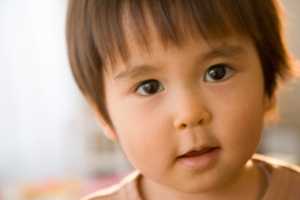MMRV Vaccine Safety Studies
Results from Studies Before MMRV Vaccine Was Licensed
Here are key findings from CDC's Vaccine Safety Datalink (VSD) studies of MMRV vaccine (before it was licensed) among children aged 12-23 months:

- Two adverse events occurred more frequently during the 42 days after the first dose of MMRV vaccine compared with separate injections of MMR and varicella vaccines—a fever of 102° F or higher and rash. Most of the risk for fever and rash was in the 5-12 days after vaccination. These conditions typically resolved on their own.
- Soreness at the injection site was reported less often after MMRV vaccine than after MMR and varicella vaccines given in separate shots at the same visit.
The rates of adverse events after MMRV vaccination were:
Soreness at injection site: 1 child out of 5;
Fever: 1 child out of 5; and
Rash: 1 child out of 20.
- The rates of adverse events for MMR and varicella vaccines administered at the same visit were:
Soreness at injection site: 1 child out of 4;
Fever: 1 child out of 7; and
Rash: 1 child out of 25.
Because these studies showed an increased risk for fever after MMRV vaccination, compared with vaccination with MMR and varicella vaccines in separate shots at the same visit, there was concern about a potential increased risk for febrile seizures (seizures triggered by a rising or dropping fever) after MMRV vaccination. As part of routine monitoring of vaccine safety for all new vaccines, CDC conducted studies of the safety of MMRV vaccine. In these studies, CDC analyzed data reported to the Vaccine Safety Datalink (VSD) regarding MMRV vaccine given to children aged 12-23 months, the age when the first dose of MMRV or MMR and varicella vaccines is recommended. The study assessed the rate of several medical events after MMRV vaccination, including febrile seizures.
Results from Studies After MMRV Vaccine Was Licensed
The following findings are from CDC's Vaccine Safety Datalink (VSD) study of the safety of MMRV vaccine (after it was licensed) among children aged 12-23 months:
- 7-10 days after the first dose of vaccination, the rate of febrile seizures was about 2 times higher among children who received MMRV vaccine (8.5 per 10,000 children vaccinated) than among children who received measles, mumps, and rubella (MMR) and varicella vaccines separately at the same visit (4.2 per 10,000 children vaccinated), mainly before MMRV vaccine became available.
- 7-10 days after vaccination, about one additional febrile seizure would be expected to occur among every 2,300 children vaccinated with first-dose MMRV vaccine compared with children vaccinated with the first doses of MMR and varicella shots at the same visit.
Merck, the manufacturer of the MMRV vaccine, also sponsored an observational study (after MMRV vaccine was licensed) of febrile seizures after the first dose of MMRV vaccine was given to children aged 12-23 months. Here are some key findings from that study:
- The rate of febrile seizures 5-12 days after first dose of vaccination was 7.0 per 10,000 children who received MMRV vaccine compared with a rate of 3.2 per 10,000 children who received measles, mumps, rubella (MMR) and varicella vaccines separately at the same visit (3.2 is the rate before MMRV vaccine became available).
- 5-12 days after vaccination, about one additional febrile seizure would be expected to occur among every 2,600 children vaccinated with the first dose of MMRV vaccine compared with children vaccinated with the first doses of MMR and varicella vaccines administered at the same visit.
These findings and other relevant data were presented to the Advisory Committee on Immunization Practices (ACIP). In May 2010, CDC released new recommendations on the use of MMRV vaccine.
To help parents and healthcare providers better understand the ACIP recommendations, risks and benefits of MMRV vaccine, and febrile seizures, the following information is available:
- For Parents and Caregivers: Fact Sheet on Measles, Mumps, Rubella, and Varicella
- For Parents and Caregivers: Frequently Asked Questions on MMRV Vaccines
- For Providers: Fact Sheet for Providers on MMR & Varicella Vaccines or MMRV Vaccine
- For Providers: Frequently Asked Questions on MMRV Vaccines
- Frequently Asked Questions about Febrile Seizures Following Childhood Vaccinations
- Information on the VSD MMRV Vaccine Safety Study
- Merck Package Insert for ProQuad (MMRV vaccine) [PDF - 681 KB]
Related Scientific Articles
Jacobsen SJ, Ackerson BK, Sy LS, Tran TN, Jones TL, Yao JF, Xie F, Cheetham TC, Saddier P. Observational safety study of febrile convulsion following first dose MMRV vaccination in a managed care setting. Vaccine 2009 Jul 23;27(34):4656-61.
Klein NP, Fireman B, Yih WK, et al. Measles-mumps-rubella-varicella combination vaccine and the risk of febrile seizures. Pediatrics 2010. In press.
- Page last reviewed: August 28, 2015
- Page last updated: August 28, 2015
- Content source:


 ShareCompartir
ShareCompartir